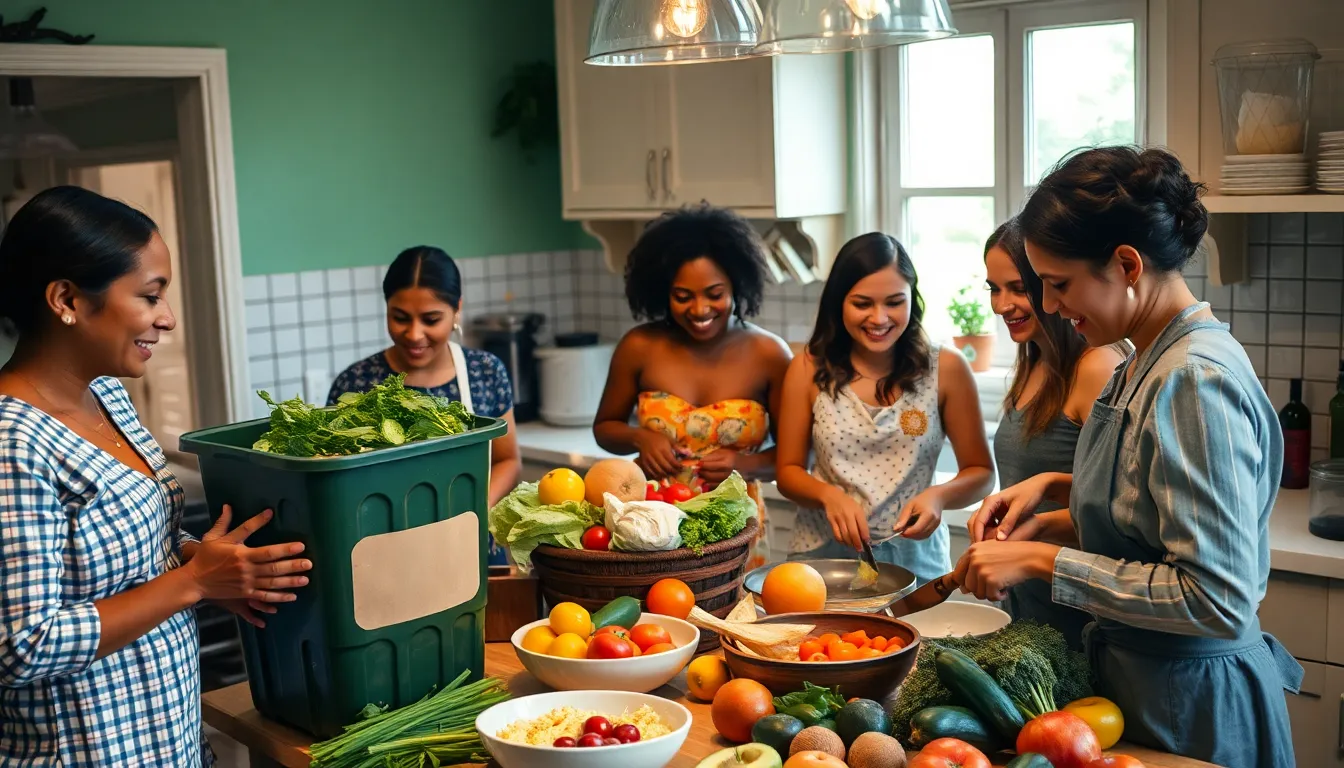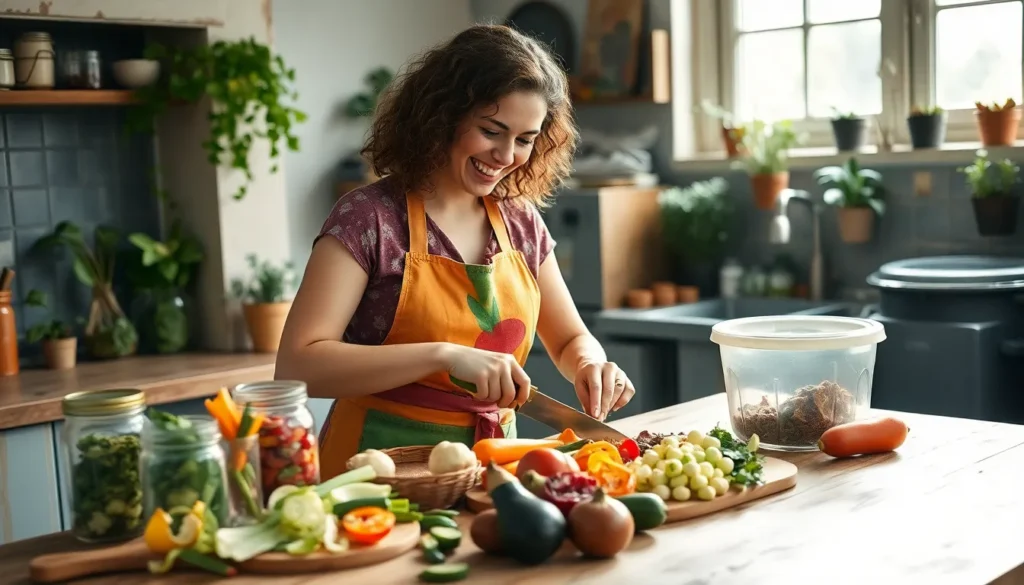Table of Contents
ToggleIn a world where food waste piles up like laundry on a Sunday, zero waste cooking swoops in like a culinary superhero. Imagine whipping up delicious meals while saving the planet—who knew being eco-friendly could taste so good? By embracing this trend, home cooks can transform scraps into culinary gold, turning potato peels into crispy chips and stale bread into gourmet croutons.
What Is Zero Waste Cooking?
Zero waste cooking emphasizes reducing food waste in the kitchen. This practice encourages the use of all edible parts of ingredients, including scraps usually discarded. Home cooks creatively repurpose leftovers, transforming them into new dishes that minimize waste and promote sustainability.
Using vegetable scraps, cooks make broths or stocks, enhancing flavors while conserving resources. Stale bread isn’t just trash; it becomes croutons or breadcrumbs, extending its lifespan. Citrus peels can flavor oils or infuse drinks, showcasing the versatility of ingredients often overlooked.
Moreover, this approach encompasses mindful meal planning. Planning prevents over-purchasing, ensuring each ingredient serves a purpose. By storing items properly, freshness extends and spoilage reduces, maximizing every dollar spent on groceries.
In addition, zero waste cooking involves composting organic waste. This practice not only diverts food from landfills but also enriches garden soil, resulting in a sustainable cycle. Resources like food preservation techniques, such as pickling or fermenting, help further utilize excess produce, keeping meals varied and interesting.
Cookbooks and online resources provide guidance on techniques and recipes. Communities share ideas, fostering creativity and collaboration among those committed to minimizing waste. Engaging in zero waste cooking creates a conscious relationship with food and demonstrates an individual’s dedication to environmental stewardship.
Benefits of Zero Waste Cooking

Zero waste cooking presents multiple benefits, particularly for the environment and personal finances. Embracing this practice transforms kitchen habits and contributes to sustainable living.
Environmental Impact
Reducing food waste plays a crucial role in mitigating climate change. Food waste contributes to greenhouse gas emissions, particularly methane, when it decomposes in landfills. Every year, approximately 1.3 billion tons of food goes to waste globally, creating a significant environmental burden. By utilizing food scraps, home cooks help decrease this waste, preserving natural resources used in food production. Composting organic materials enriches soil and promotes healthy ecosystems. Mindful meal preparation further ensures less waste, as cooks buy only what they need. Ultimately, zero waste cooking fosters a stronger connection between individuals and their environment.
Economic Savings
Cutting back on food waste leads to substantial cost savings. Households throw away roughly 30-40% of the food they purchase, which translates to losing hundreds of dollars annually. Buying only necessary items reduces grocery bills and allows individuals to invest in higher-quality ingredients. By repurposing leftovers and making use of all edible parts, cooks maximize their purchases. Meal planning can also minimize impulse buys, resulting in smarter shopping habits. Overall, zero waste cooking not only curbs waste but also enhances financial stability.
Key Principles of Zero Waste Cooking
Zero waste cooking revolves around maximizing every ingredient while minimizing waste. By embracing a few key principles, home cooks can significantly contribute to sustainability efforts.
Planning and Preparation
Mindful meal planning prevents over-purchasing and encourages the use of all ingredients. By creating a shopping list that includes only necessary items, individuals can avoid impulse buys. Choosing recipes that utilize similar ingredients fosters efficiency and reduces spoilage. Organizing the kitchen helps keep track of ingredients on hand, making it easier to prioritize usage. Regularly checking pantry supplies before shopping leads to better decisions, ultimately minimizing food waste.
Using Leftovers Creatively
Leftover ingredients offer numerous opportunities for culinary creativity. Transforming stale bread into croutons or breadcrumbs enhances various dishes. Vegetable scraps can be repurposed into flavorful broths that enrich future meals. Incorporating past meals into new recipes revitalizes leftovers without the repetitiveness. Dishes like frittatas or stir-fries can creatively incorporate various leftover items. Rethinking food scraps not only adds flavor but also reduces the overall environmental impact.
Tips for Practicing Zero Waste Cooking
Implementing zero waste cooking practices can lead to significant reductions in food waste and environmental impact. Here are some actionable tips for home cooks.
Shopping Smart
Buy only what’s necessary to prevent over-purchasing. Focus on local produce and seasonal items for freshness and to reduce transportation emissions. Consider buying in bulk for staples like grains and legumes, minimizing packaging waste. Use a shopping list to streamline purchases and avoid impulse buys. Explore smaller grocery stores or farmers’ markets for unique ingredients that might encourage creativity. Always check pantry shelves first to use what’s already available.
Proper Food Storage
Store food correctly to extend freshness and minimize spoilage. Use airtight containers for perishable items to maintain quality. Avoid crowding in the refrigerator; proper air circulation helps keep ingredients fresh longer. Consider freezing excess produce and cooked meals for later use. Utilize clear bins and labels to keep track of items and prioritize consumption based on expiration dates. Implementing these storage techniques reduces waste and maximizes ingredient longevity.
Zero waste cooking is more than just a trend; it’s a transformative approach that empowers individuals to make a positive impact on both the environment and their finances. By embracing creativity in the kitchen and utilizing every part of ingredients, home cooks can significantly reduce food waste while enjoying delicious meals.
Mindful meal planning and smart shopping habits not only lower grocery bills but also foster a deeper connection to food and sustainability. As more people adopt these practices, the ripple effect can lead to a healthier planet and a more conscious society. With the right mindset and tools, anyone can become a culinary superhero in the fight against food waste.





